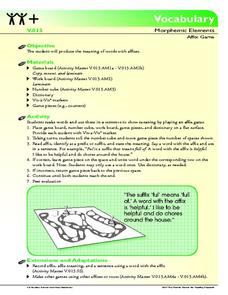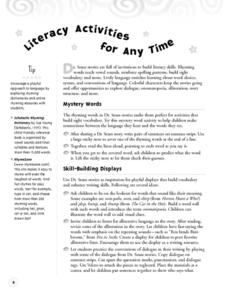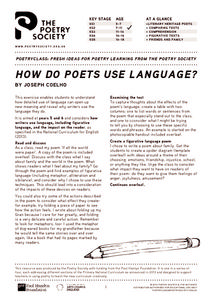Project Noah
Writing Goes Wild
Young scientists develop their observation and writing skills as they craft and then post a detailed description of a plant or animal they have spotted and photographed.
Wordpress
I Can Find Slope
Your young mathematicians will appreciate this wonderfully organized summary and explanation of linear slope. Approaching slope as it looks in a table of values, on a graph, in an equation, and between two points, this note sheet is...
Florida Center for Reading Research
Vocabulary Morphemic Elements: Affix Game
How well do you know your affixes? Find out how proficient your learners are with a game that requires them to define various affixes and use them to create words that will go into sentences.
Jamie York Press
Pythagorean Theorem Cutout Puzzle
If you'd like your lesson on the Pythagorean Theorem to be fun and engaging, check out a math puzzle activity for high schoolers. Your learners will enjoy this visual puzzle that shows how the Pythagorean Theorem works.
Wordpress
Equation Table Graph
Your Algebra learners will appreciate this fabulous, two-page printable. The first page has a list of numbers that lead to the learners writing an equation in a cloud that represents these numbers, and then filling in a table, and...
MENSA Education & Research Foundation
It’s Greek to Me: Greek Mythology
Designed as extension exercises in homeschool or classroom settings, as well as for individual work, the ideas in this packet are sure to engage learners in an investigation of Greek mythology.
Random House
Go Fish!
"One fish, two fish, red fish, blue fish." Kids color, cut out, shuffle and deal a set of cards to play Go Fish!, use hams and green egg cards to play tic-tac-toe, and engage in other activities connected to books by Dr. Seuss. Oh, the...
Scholastic
Literacy Activities for Any Time
As the title suggests, this packet is loaded with activities that can be used at any time. The common element in all the exercises is that they are connected to books by Dr. Seuss.
Curated OER
Beowulf: Lesson Plan and Supplementary Materials
A reading of Beowulf: Dragon Slayer, Rosemary Sutcliff's retelling of the classic epic poem, launches an exploration of what it means to be a hero, a noble leader, and a great warrior. A great way to introduce middle schoolers to this...
Virginia Department of Education
Exploring 3-D Geometry
Take young mathematicians on an exploration of the world of 3-D geometry with this seven-lesson unit. After first defining the terms perimeter, area, and volume and how they apply to the real world, students continue on to learn the...
National Security Agency
Introducing Integers and Their Operations
There's nothing negative about this mini-unit on integers! Engaging young mathematicians in a series of hands-on activities and collaborative learning opportunities, this resource offers an excellent way to introduce your class to...
Illinois Music Education Conference
Taking the “General” Out of Middle School General Music!
Middle schoolers will sing the praises of this music program. The resource, designed as an overview for music instructors, is loaded with ideas, activities, and links. Not a sour note in the packet.
Briscoe Center for American History
Mary Maverick and Texas History - Part 2
To conclude their investigation of the life of Mary Maverick and to demonstrate their ability to analyze primary source documents, groups use the SOAPS questioning method to examine Maverick's account of events in early Texas history.
Briscoe Center for American History
Mary Maverick and Texas History - Part 1
What's the difference between a diary and a memoir? Young historians explore the ramifications of this question as they learn how to use primary source materials to gain an understanding of life on the Texas frontier.
Briscoe Center for American History
Applying the SOAPS Method of Analyzing Historical Documents
Young historians use the SOAPS (Speaker, Occasion, Audience, Purpose, Subject) method of questioning to determine the historical value of primary source documents. The third in a series of five lessons that model for learners how...
Scholastic
Step-by-Step Strategies for Teaching Expository Writing
A carefully crafted, logically organized, 128-page packet is an excellent addition to your unit on expository writing.
Crafting Freedom
Frances Ellen Watkins Harper: Lover of Literacy
This, the sixth in a series of 10 related resources, examines the life and works of Frances Ellen Watkins Harper, an African American author, born in 1825, who advocated literacy for both free and enslaved African Americans.
Crafting Freedom
George Moses Horton: Crafting Virtual Freedom Through Poetry
What is "virtual freedom"? How about "enslaved entrepreneurship"? Class members will learn about these terms and much more as they read the poems and examine the life of George Moses Horton.
Crafting Freedom
Harriet Jabocs and Elizabeth Keckly: The Material and Emotional Realities of Childhood in Slavery
Learning how to make accurate inferences by putting together facts found in multiple sources is one of those skills all learners must develop, but one that can be a challenge to teach. This resource is a must-have for your curriculum...
Poetry Class
Eccentricity and Sound
What do Lady Gaga and Dame Edith Sitwell have in common? As they examine Sitwell's poetry, class members learn that the similarities are far more than their unique appearance.
Poetry Society
How do Poets Use Language?
Why do writers choose the language they do? Here's a resource that has the poet himself answer that very question. Joseph Coelho explains why he chose the words and images he used in his poem, "If All the World Were Paper."
Have Fun Teaching
The State of Things
Is it a solid, liquid. or gas? Cut out these graphics for a fun manipulative game that has kids sorting everyday items into their states of matter. They complete three worksheets referencing the sorting activity.
Poetry Society
Simile and Metaphor
Young poets use word cards to prompt a metaphor poem comparing to very dissimilar items.
Poetry Society
A Conceit Poem
Young writers needn't be self-involved to craft a conceit. Directions for how to craft this form of extended metaphor, models, and a worksheet are all included in the packet.

























